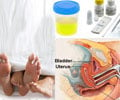Researchers at the University of Cambridge have developed a new chlamydia test that can tell people within 30 minutes if they have the sexually transmitted infection (STI).
Researchers at the University of Cambridge have developed a new chlamydia test that can tell people within 30 minutes if they have the sexually transmitted infection (STI).
Developed by a team of researchers led by Dr Helen Lee at the University of Cambridge, the new rapid test uses self-collected vaginal swabs which are much easier to obtain and up to twice as accurate, rather than cervical swabs.In trials the new Chlamydia rapid test (CRT) detected the STI in more than four out of five infected women, even though most showed no symptoms.
This sensitivity is similar to some of the current gold standard nucleic acid amplification tests used in screening programmes, including in the UK. The rapid test can provide results in less than 30 minutes while the nucleic acid based tests can take weeks.
Researchers said that it could become a valuable addition to screening programmes already in place, as well as providing a crucial diagnostic test in the developing world.
"The speed of the CRTs means that we can provide a 'test and treat' strategy, offering immediate clinical care to the patient. This has the benefits of reducing the risk of complications and preventing onward transmission," Dr Lee said.
The new Chlamydia rapid test could also be used in settings such as mobile clinics and outreach clinics to help improve the screening coverage of difficult-to-reach populations. Penny Barber, Chief Executive of Brooks in Birmingham, a young people’s sexual health clinic which participated in the evaluation of the new test says: "The Chlamydia Rapid Test is about more than speed of treatment for positive clients, vital though that is from a public health perspective.
Advertisement
Dr. Lourdes Mahilum-Tapay, who led the clinical trials, said: “Because the test is easy to use and is robust, it can be used in a clinic in London or the Philippines. The test can be implemented easily without the need for laboratory equipment or highly trained staff."
Advertisement
The study is published in British Medical Journal.
Source-ANI
LIN/M








